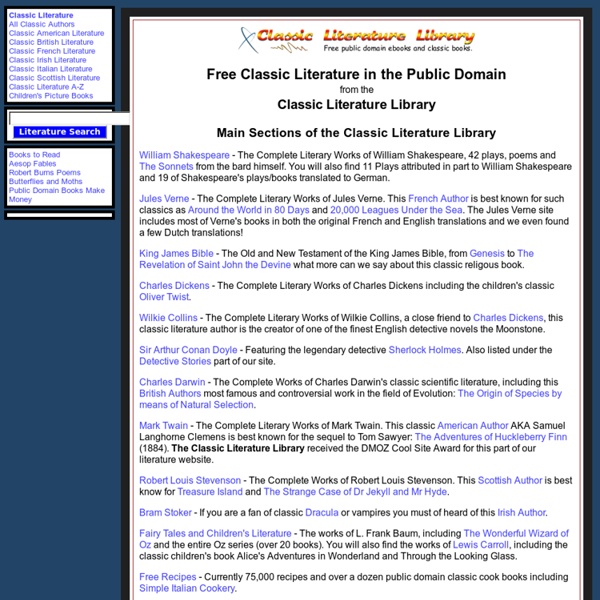



Literature.org - The Online Literature Library Read book online: Literature books,novels,short stories,fiction,non-fiction, poems,essays,plays,Pulitzer prize, Nobel prize Invitation to World Literature Greek, by Euripides, first performed in 405 BCE The passionate loves and longings, hopes and fears of every culture live on forever in their stories. Here is your invitation to literature from around the world and across time. Sumerian, 2600 BCE and older Turkish, by Orhan Pamuk, 2000 Greek, by Homer, ca. eighth century BCE Greek, by Euripides, first performed in 405 BCE Sanskrit, first century CE Japanese, by Murasaki Shikibu, ca. 1014 Chinese, by Wu Ch'êng-ên, ca. 1580 Quiché-Mayan, written in the Roman alphabet ca. 1550s French, by Voltaire, 1759 English, by Chinua Achebe, 1959 Spanish, by Gabriel García Márquez, 1967 English, by Arundhati Roy, 1998 Arabic, first collected ca. fourteenth century
The Online Books Page: Search Examples: Entering austen, jane in the Author field finds books by Jane Austen. Entering Baum in the Author field and and oz in the Title field finds L. Frank Baum's Oz books. Entering dosto in the Author field, choosing the Exact start of name option, and entering underground in the Title field finds Fyodor Dostoyevsky's Notes from the Underground, even if you don't remember how to spell more than the start of the author's name! (Hey, we've changed the spelling in our own database at least once.) If you have an old browser that does not understand forms, the old author search and title search are still available. Home -- Search -- New Listings -- Authors -- Titles -- Subjects -- Serials Books -- News -- Features -- Archives -- The Inside Story Edited by John Mark Ockerbloom (onlinebooks@pobox.upenn.edu) OBP copyrights and licenses
Free eBooks at Planet eBook - 80+ Classic Novels and Literature 50 Life Secrets and Tips Memorize something everyday.Not only will this leave your brain sharp and your memory functioning, you will also have a huge library of quotes to bust out at any moment. Poetry, sayings and philosophies are your best options.Constantly try to reduce your attachment to possessions.Those who are heavy-set with material desires will have a lot of trouble when their things are taken away from them or lost. Possessions do end up owning you, not the other way around. Become a person of minimal needs and you will be much more content.Develop an endless curiosity about this world.Become an explorer and view the world as your jungle. Read “Zen and the Art of Happiness” by Chris Prentiss.This book will give you the knowledge and instruction to be happy at all times regardless of the circumstances.
Classic Book Info | Your guide to classic books… Perseus Digital Library 8 Things Everybody Ought to Know About Concentrating “Music helps me concentrate,” Mike said to me glancing briefly over his shoulder. Mike was in his room writing a paper for his U.S. History class. Mike made a shift about every thirty seconds between all of the above. Do you know a person like this? The Science Behind Concentration In the above account, Mike’s obviously stuck in a routine that many of us may have found ourselves in, yet in the moment we feel it’s almost an impossible routine to get out of. When we constantly multitask to get things done, we’re not multitasking, we’re rapidly shifting our attention. Phase 1: Blood Rush Alert When Mike decides to start writing his History essay, blood rushes to his anterior prefrontal cortex. Phase 2: Find and Execute The alert carries an electrical charge that’s composed of two parts: first, a search query (which is needed to find the correct neurons for executing the task of writing), and second, a command (which tells the appropriate neuron what to do). Phase 3: Disengagement 1. 2. 3. 4.